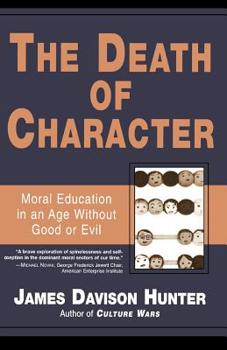The Death of Character: On the Moral Education of America's Children
Select Format
Select Condition 
Book Overview
The Death of Character is a broad historical, sociological, and cultural inquiry into the moral life and moral education of young Americans based upon a huge empirical study of the children themselves. The children's thoughts and concerns-expressed here in their own words-shed a whole new light on what we can expect from moral education. Targeting new theories of education and the prominence of psychology over moral instruction, Hunter analyzes the making of a new cultural narcissism.
Format:Paperback
Language:English
ISBN:0465031773
ISBN13:9780465031771
Release Date:May 2001
Publisher:Basic Books
Length:336 Pages
Weight:0.95 lbs.
Dimensions:0.8" x 5.7" x 8.3"
Customer Reviews
5 ratings
Is a credible read
Published by Thriftbooks.com User , 19 years ago
Hunter blames the problems in modern society on a lack of moral education, which he says results from multinational capitalism, pluralism, social mobility, contemporary media, popular culture, and the changing nature of relationships in America. The scope of this book is broad but worthwhile.
Thoughful, clear, and enjoyable.
Published by Thriftbooks.com User , 20 years ago
While I did not agree with all of Hunter's arguments, I highly reccommend this book. Hunter provides a thoughtful examination of the history of moral education and how contemporary character education, although well-intentioned, does little to improve the morality of youth. Character, as defined by Aristotle, requires not only knowing the good but being able to reason about it. This wisdom, or what Aristotle called phronesis, is something that is overlooked in our modern climate of fast, easy, and scientifically "proven" methods. Hunter makes a profound argument as to how both character education and psychological approaches perpetuate, rather than ameliorate the problem of thin and narrow moral understandings. However, disagree with Hunter's sentiment that the problem is unsolvable (as is clearly suggested by his title). ...but that is another issue altogether. Don't get me started!
Thoughful, clear, and enjoyable.
Published by Thriftbooks.com User , 20 years ago
While I did not agree with all of Hunter's arguments, I highly reccommend this book. Hunter provides a thoughtful examination of the history of moral education and how contemporary character education, although well-intentioned, does little to improve the morality of youth. Character, as defined by Aristotle, requires not only knowing the good but being able to reason about it. This wisdom, or what Aristotle called phronesis, is something that is overlooked in our modern climate of fast, easy, and scientifically "proven" methods. Hunter makes a profound argument as to how both character education and psychological approaches perpetuate, rather than ameliorate the problem of thin and narrow moral understandings. However, disagree with Hunter's sentiment that the problem is unsolvable (as is clearly suggested by his title). ...but that is another issue altogether. Don't get me started!
A sobering look at character education in the schools
Published by Thriftbooks.com User , 23 years ago
Character education is an inherent part of teachers' jobs. Whether intended or not, students learn just as much from the examples teachers set as the curriculum they teach. Formal character education, however, has become a recent outgrowth of growing concerns that our schools are not doing what they should to impart the common culture, or that schools are the panacea for society's ills. Programs attempting to remedy these needs of society have been around as long as public schools have existed. As Hunter points out, these programs are not just a sign of the demand that exists, but are also a measure of the intensity of our fears.Strategies we have devised, Hunter asserts, aggravate rather than ameliorate the problem. This comprehensive study of the history and philosophy behind the character education movement provides an insightful view of just why our best intentions tend to go awry when these attempts are administered.Perhaps what we should be questioning is whether these are truly our best attempts. As Hunter says, "One need not listen very long to realize that children have become a code for speaking about ourselves. In claiming to put children first, we often place them last -- or at least subordinate to ideology."This is a recommended read to any parents, teachers, or administrators thinking of putting into place a structured character education program in a school.
Why Character Doesn't Count (anymore)
Published by Thriftbooks.com User , 24 years ago
The sociologist J. D. Hunter performs a tremendous service by diagnosing the reasons for the failure of current character education programs. In a nutshell, these programs have assimilated the methodological and philosophical assumptions of modern psychology, specifically its emphasis upon self-esteem and the notion of an innate moral disposition discovered through self-actualization. Character, however, is, according to Hunter, the product of sociation within communities in which the individual is under an externally-imposed authority. While the book strongly implies that pre-modern views of moral education had it essentially right, Hunter is critical of neo-classicists such as Wm. Bennett who neglect the fact that moral precepts cannot be lifted out of their particular moral traditions without serious loss of meaning. In this, Hunter is clearly indebted to the work of Alasdair MacIntyre, who is infrequently cited. Hunter clearly cannot be expected to capture this debate in all its complexity; nevertheless, he never addresses the single most important objection to his (and MacIntyre's) view of the particularity of practical reason: that it leads inevitably to relativism. Still, this is an extremely valuable book for anyone interested in character education, particularly regarding the relationship of character education to worldview commitments. It will also be of value to those who seek to understand the influence of modern Romanticism on 20th-century ideas and institutions, particularly within public education circles. One further note: the book is well-written and -researched, with a fine bibliography.






